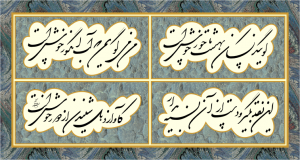Omar Khayyam was a fascinating Persian mathematician, poet, astronomer, astrologer and philosopher who lived between the 11th and 12th centuries. The figure of Khayyam could be the subject of dozens of posts. I will devote this one to some of his poetry, his Rubaiyat.
Rubaiyats are poetic compositions composed of two long lines of verse broken down into four hemistichs that rhyme first with second and fourth,  the third being free.
the third being free.
Presumably their origin was Persian, although they later passed into Arabic and Turkish literature. “Very close in its brevity to the haiku, on the one hand, and to the epigram, on the other,” wrote Clara Janés in her prologue to Alianza’s bilingual edition of the Rubaiyat, “as the latter gives rise to the enunciation of such categorical lapidary concepts, in the case of Omar Jayyam, that the reader feels that the four verses before him contain an entire conception of life, with its premises, development and conclusion.
Khayyam’s rubaiyats share with his mathematical demonstrations the flavour of the inescapable, of what by pure logic will come to be. The rubaiyats are austere, devoid of rhetoric, and they express the loneliness of the human being with unmistakable forcefulness:
In the circle that is our coming and going,
whose beginning and end are invisible…
No one in this concept finds truth,
That this coming from, where does it come? And this going, where does it go?
They contain symbolic mentions of the passage of time and oblivion that cut like a scalpel, showing, at times, a disheartening sense of the inevitability of death.
The dawn has come, arise, my beauty,
recreate yourself, play the harp and drink wine,
for those who are here will not last long
and those who left, passed into oblivion
Agnostic, if not outright atheist – almost lethal in the time and context in which he lived – some of his rubaiyat are a veritable assault on the intransigence of gods and religions.
Tell me, what man has never transgressed Your law?
Tell me, what pleasure is there in a life without sin?
If Thou punishest with evil the evil I have done to Thee,
tell me what is the difference between you and me?
But there are also very sweet ones, in which Jayyam proposes that we grasp the happiness of the moment and renounce the siren songs of what awaits us in the hereafter:
I know nothing; he who created me
made me a man of hell, or of paradise.
A cup, a beautiful one and a lute at the edge of the field:
these three things for me in cash, and for you the promised heaven.
References:
Omar Jayyam, Rubayat, Alianza Editorial, Madrid, 2008.
Antonio J. Durán, El ojo de Shiva, el sueño de Mahoma, Simbad… y los números, Destino, Barcelona, 2012.

Creo que fue uno de los primeros pensadores que valoro la INTUICION.
Ustedes que son amistosos para mis más elevados intereses, saben bien cuanto tiempo hace que residiendo en este cuerpo, corteje la Verdad. Busque una nueva unión abarcadora que comprendiese el cuerpo mismo, la mente y el espíritu. Tuve éxito desde mi conciencia la árida razón teórica e instaure la intuición. Esa hija del éxtasis que revela al espíritu.
Los deseos del alma
Omar Khayyam
Me he quedado anonadado, es increíble, lo bonito y extraordinario de sus poemas.No
lo concibo escribir así en el siglo XI o XII. Tanta claridad. Intentaré a ver si lo encuentro en internet o en la biblioteca pública o comprar el libro.
Hay un libro muy interesante que se llama Samarcanda y es ahí donde descubri a Omar.